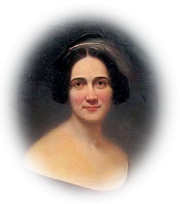June 19th.–In England Mr. Gregory and Mr. Lyndsey rise to say a good word for us. Heaven reward them; shower down its choicest blessings on their devoted heads, as the fiction folks say.
Barnwell Heyward telegraphed me to meet him at Kingsville, but I was at Cool Spring, Johnny’s plantation, and all my clothes were at Sandy Hill, our home in the Sand Hills; so I lost that good opportunity of the very nicest escort to Richmond. Tried to rise above the agonies of every-day life. Read Emerson; too restless–Manassas on the brain.
Russell’s letters are filled with rubbish about our wanting an English prince to reign over us. He actually intimates that the noisy arming, drumming, marching, proclaiming at the North, scares us. Yes, as the making of faces and turning of somersaults by the Chinese scared the English.
Mr. Binney ¹ has written a letter. It is in the Intelligencer of Philadelphia. He offers Lincoln his life and fortune; all that he has put at Lincoln’s disposal to conquer us. Queer; we only want to separate from them, and they put such an inordinate value on us. They are willing to risk all, life and limb, and all their money to keep us, they love us so.
Mr. Chesnut is accused of firing the first shot, and his cousin, an ex-West Pointer, writes in a martial fury. They confounded the best shot made on the Island the day of the picnic with the first shot at Fort Sumter. This last is claimed by Captain James. Others say it was one of the Gibbeses who first fired. But it was Anderson who fired the train which blew up the Union. He slipped into Fort Sumter that night, when we expected to talk it all over. A letter from my husband dated, “Headquarters, Manassas Junction, June 16, 1861:”
My Dear Mary: I wrote you a short letter from Richmond last Wednesday, and came here next day. Found the camp all busy and preparing for a vigorous defense. We have here at this camp seven regiments, and in the same command, at posts in the neighborhood, six others–say, ten thousand good men. The General and the men feel confident that they can whip twice that number of the enemy, at least.
I have been in the saddle for two days, all day, with the General, to become familiar with the topography of the country, and the posts he intends to assume, and the communications between them.
We learned General Johnston has evacuated Harper’s Ferry, and taken up his position at Winchester, to meet the advancing column of McClellan, and to avoid being cut off by the three columns which were advancing upon him. Neither Johnston nor Beauregard considers Harper’s Ferry as very important in a strategic point of view.
I think it most probable that the next battle you will hear of will be between the forces of Johnston and McClellan.
I think what we particularly need is a head in the field–a Major-General to combine and conduct all the forces as well as plan a general and energetic campaign. Still, we have all confidence that we will defeat the enemy whenever and wherever we meet in general engagement. Although the majority of the peopie just around here are with us, still there are many who are against us.
God bless you. Yours,
James Chesnut, Jr.
Mary Hammy and myself are off for Richmond. Rev. Mr. Meynardie, of the Methodist persuasion, goes with us. We are to be under his care. War-cloud lowering.
Isaac Hayne, the man who fought a duel with Ben Alston across the dinner-table and yet lives, is the bravest of the brave. He attacks Russell in the Mercury–in the public prints–for saying we wanted an English prince to the fore. Not we, indeed! Every man wants to be at the head of affairs himself. If he can not be king himself, then a republic, of course. It was hardly necessary to do more than laugh at Russell’s absurd idea. There was a great deal of the wildest kind of talk at the Mills House. Russell writes candidly enough of the British in India. We can hardly expect him to suppress what is to our detriment.
______
¹ Horace Binney, one of the foremost lawyers of Philadelphia, who was closely associated with the literary, scientific, and philanthropic interests of his time. His wife was a sister of Mrs. Chesnut, the author’s mother-in-law.
